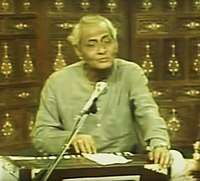Akhilbandhu Ghosh
Akhilbandhu Ghosh (Bengali: অখিলবন্ধু ঘোষ) (20 October, 1920 - 20 March, 1988) was a Bengali male singer from Kolkata, West Bengal, India. He is considered as one of the greatest exponents of Bengali classical based vocal music. [1]
Akhilbandhu Ghosh | |
|---|---|
 Ghosh | |
| Background information | |
| Born | 20 October 1920 Kolkata, West Bengal, India |
| Died | 20 March 1988 (aged 67) |
| Occupation(s) | Singer |
Early years
Akhilbandhu Ghosh was born to Sri Bamandas Ghosh and Smt. Manimala Ghosh of Kolkata. In the early years he was a shy and introvert boy. He studied in Bhabanipur Nasiruddin Memorial School of Kolkata. Hemanta Mukherjee was one of his close friends since his childhood days. He received the first lessons in music from his maternal uncle Sri Kalidas Guha. Later he took lessons from Nirapada Mukhopadhyay, Tarapada Chakraborty and Chinmoy Lahiri.[2]
Personal life
He married Smt. Dipali Ghosh in 1947 and led a very happy married life. Dipali was Akhilbandhu’s disciple and a noted singer too. The childless couple devoted their life in teaching classical based vocal music to hundreds of disciples in their house located at 25, Turf Road, Bhabanipur, Kolkata.[2]
Career
Akhilbandhu published his first album in 1947 containing two songs in 78 RPM record; Ekti kusum jaabe and Amar kanone phutechhilo phul, though some of his unpublished songs were recorded much earlier.[2] He was unparalleled in modern classical based Bengali songs and recorded many songs which became very popular. Some of these are: ‘আজি চাঁদিনি রাতি গো’, ‘ওই যে আকাশের গায়ে, দূরের বলাকা ভেসে যায়’, ‘শিপ্রা নদীর বুকে সন্ধ্যা নামিল হায়’, ‘তোমার ভুবনে ফুলের মেলা’etc.[3]
For several years he was associated with the Bengal Music College, founded by Nanigopal Bhattacharya in 1940. [4]
Discography
List of all songs sung or composed by Akhilbandhu Ghosh (in alphabetical order)
Legacy
Akhilbandhu Ghosh's songs had become synonymous with the romantic ode in Bengali. Kabir Suman, an artist who initiated New wave in Bengali modern songs, mentioned Akhilbandhu Ghosh in one of his compositions of 1970, বয়স আমার মুখের রেখায় (Bayas amar mukher rekhay), where it was said,[5]
|
একলা লাগার সময় মানে |
|
Death
On March 20, 1988, Akhilbandhu came back from Andal attending a musical soiree, feeling unwell. He was admitted to P G Hospital first, and shifted to Sambhunath Pandit Hospital. He breathed his last in the afternoon, survived by his wife and three sons.
References
- Sengupta, Subodh Chandra, ed. (2010). সংসদ বাঙালি চরিতাভিধান. Sahitya Sangsad.
- Mukhopadhyay, Sandip. "অখিলবন্ধু ঘোষ - মার্জিত শোভন সুরসৃষ্টি" (PDF). Retrieved 24 November 2010.
- Mukhopadhyay, Anirban (20 October 2017). "মৃত্যুর পরে ক্রমশ বেঁচে উঠেছেন এই ৫ বাঙালি". Retrieved 24 November 2010.
- Bandyopadhyay, Sankarshan. "লোকসঙ্গীতকে বিকৃত করছেন কিছু মানুষ". Retrieved 24 November 2010.
- Viewable on YouTube: বয়স আমার মুখের রেখায় on YouTube